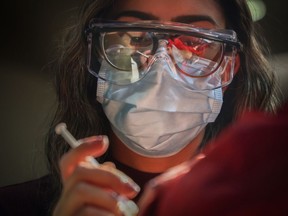Nursing students will be paid, have opportunity at full-time employment as they join the COVID-19 front line: AHS

Article content
Nursing students who are joining the front lines of the COVID-19 fight will be paid for their services, and many will have an opportunity at full-time work once they complete their program, says Alberta Health Services.
Fadumo Robinson, associate chief nursing officer with AHS, said more than 600 nursing students in their final semester at Alberta universities and colleges have agreed to work, mainly in acute-care settings, to help alleviate staffing pressures on the provincial health-care system.
She said the idea to employ students first came about in December when they asked post-secondary institutions if their students would be interested. As of Friday, some were already on the front lines while others will be beginning their new roles in the coming weeks.
“They’re getting paid for the time but the hours will be counted towards their graduation,” said Robinson. “We want all of them to stay in Alberta to work in Alberta Health Services, our counterparts Covenant Health and others. It’s not only assisting with the surge and it’s not only getting a job where you’re paid as you finish your final hours, but they are becoming part of the team.”
Robinson said the students will be stationed across the province.
Premier Jason Kenney first announced the initiative on Thursday, saying 610 students will be involved. They will form one part of the province’s latest plan to address stresses on the provincial health-care system created by a rising number of COVID-19 infections requiring hospital care.
Kenney also announced a new partnership between AHS and primary care networks that will help Albertans with mild COVID-19 symptoms receive care outside of hospitals. Additionally, there will be more beds opened to care for COVID-19 patients in Edmonton and Calgary. In some settings, a group of health-care practitioners will care for a group of COVID-19 patients, rather than one physician caring for a smaller group of patients.
Speaking at the same update, AHS president and CEO Dr. Verna Yiu said health-care teams are exhausted and about five per cent of the workforce, or 5,500 people, are out sick at any one time.
“This is having an impact on our ability to fully staff our units and wards, and we know that given any one day about 18 to 20 per cent of shifts are being missed due to staff calling in sick,” said Yiu.
AHS will be allowing eligible unvaccinated workers to return to the job while undergoing frequent testing.
Robinson said the nursing students will provide “incredible support.” She said AHS typically hires nursing students in the summer, but the new program gives them early access to the students.
“This is a time where they are normally at school full-time so we don’t normally have access to them,” said Robinson. “So having that many students come into the health-care system and assist with our response to the surge is incredible.
Elizabeth Van Den Kerkhof, director of Mount Royal University’s School of Nursing and Midwifery, said about 75 per cent of its nursing students who are in their final year applied to be part of the program.
“Our senior students have, in fact, been in wards where there are COVID patients and (are) caring for patients with COVID. Our thinking is we would rather they learn how to do this safely under the supervision of someone else, rather than not doing it until they are finally out on their own,” said Van Den Kerkhof.
Nursing students typically have to complete a work placement in their final year of study, where they are paired with a registered nurse. Van Den Kerkhof said that under this program, the students will still be under supervision but will most likely be taking on additional responsibilities.
“That will help pick up some of the workload in the unit, as a student will have will still have that preceptor overseeing their work, but there will be more patients so perhaps a little more independence as they as they become more familiar with the work,” said Van Den Kerkhof.
Alberta previously allowed nursing students who had their programs cut short at the onset of the pandemic to fast track the completion of their studies to enter the workforce. Both Van Den Kerkhof and Robinson said this program is different, as the students will be able to complete their studies while working.






Postmedia is committed to maintaining a lively but civil forum for discussion. Please keep comments relevant and respectful. Comments may take up to an hour to appear on the site. You will receive an email if there is a reply to your comment, an update to a thread you follow or if a user you follow comments. Visit our Community Guidelines for more information.